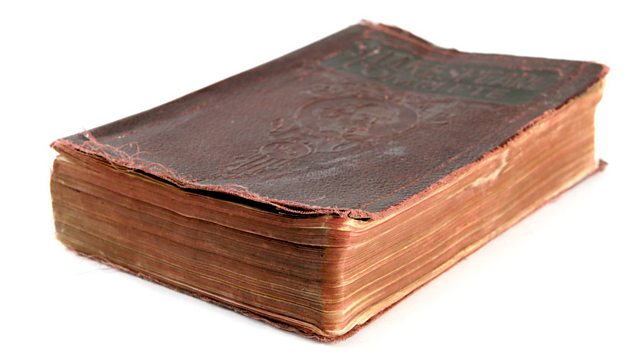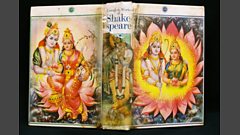20. Shakespeare Goes Global
From first folio to the 'Robben Island Bible', Neil MacGregor shows how Shakespeare became a global phenomenon. From May 2012.
The publication of the First Folio of Shakespeare's collected plays in 1623 began the process of turning an early modern playwright into a global phenomenon.
An annotated copy of the Collected Works of Shakespeare reveals the extent to which Shakespeare has inspired and influenced audiences across the globe and through the ages.
Object-based history series presented by Neil MacGregor, former Director of the British Museum.
Taking artefacts from William Shakespeare's time, he explores how Elizabethan and Jacobean playgoers made sense of the unstable and rapidly changing world in which they lived.
With old certainties shifting around them, in a time of political and religious unrest and economic expansion, Neil asks what the plays would have meant to the public when they were first performed.
He uses carefully selected objects to explore the great issues of the day that preoccupied the public and helped shape the works, and he considers what they can reveal about the concerns and beliefs of Shakespearean England.
Producer: Paul Kobrak
First broadcast on Â鶹Éç Radio 4 in May 2012.
Last on
More episodes
Previous
Next
You are at the last episode
The Plays in Print
Date: 1970
Size: H: 215mm, W: 150mm
Made in: London/Glasgow
Made by: Collins (publisher)
Material: Paper
Ìý
In this series, we've been looking at Shakespeare's first audiences and the expanding, restless world they inhabited. Today we're looking at something very different: how Shakespeare's audience left the Globe and became the whole world.
Ìý
The publication in 1623 of Mr William Shakespeare's Comedies, Histories, & Tragedies, more commonly referred to as the First Folio, meant that Shakespeare's plays were preserved for future generations. Over the last 400 years his words have travelled across continents and have been translated into hundreds of languages, speaking to all of us about our hopes, our fears and our dreams.
Ìý
Today's programme looks at some of the many copies of Shakespeare's plays in existence today, and we speak to some of the people whose lives his words have touched.
Ìý
Private collection
Ìý
Ìý
Background
- Shakespeare's completed works, often called the First Folio, was the first exclusive play collection in book form
- The First Folio, published in 1623, is 908 pages long. It's 14 inches by 9 inches, and 3 inches thick
- There were three further amended versions - the Second Folio in 1632, the Third Folio in 1664 and the Fourth Folio in 1685
- There are 232 known copies of the First Folio in existence
- A First Folio sold in 2002 for 7 million dollars
More from Radio 4: William Shakespeare

Matthew Parris presents the biographical series. Poetry curator Daisy Goodwin nominates the Bard, William Shakespeare. She is joined by Dominic Dromgoole of the Globe Theatre.
Ìý
More from Radio 4: The Ensemble

James Naughtie goes backstage as the Royal Shakespeare Company celebrates its 50th birthday. James follows Michael Boyd and company prepare the new production, Macbeth.
Ìý
More from Radio 4: Shakespeare's Work

Melvyn Bragg discusses whether the work of William Shakespeare is indeed 'not of an age but for all time' or merely increasingly irrelevant museum pieces embalmed in out of reach language.
Ìý
More from Radio 4: Shakespeare's Life

Melvyn Bragg discusses what we know about the life of William Shakespeare, a tantalising conundrum that has exercised minds since the day the playwright died.
Ìý
More from Radio 4: Nelson Mandela Release

Sue MacGregor reunites the core negotiators and key campaigners involved in the secret talks which ultimately led to the release of Nelson Mandela from prison in 1990.
Ìý
Broadcasts
- Fri 11 May 2012 13:45Â鶹Éç Radio 4
- Fri 11 May 2012 19:45Â鶹Éç Radio 4
- Fri 2 Nov 2012 14:15Â鶹Éç Radio 4 Extra
- Fri 3 Apr 2015 14:15Â鶹Éç Radio 4 Extra
- Sat 4 Apr 2015 02:15Â鶹Éç Radio 4 Extra
- Fri 5 Aug 2016 13:45Â鶹Éç Radio 4 FM
- Fri 11 May 2018 14:15Â鶹Éç Radio 4 Extra
- Sat 12 May 2018 02:15Â鶹Éç Radio 4 Extra
- Fri 10 Nov 2023 07:15Â鶹Éç Radio 4 Extra
- Fri 10 Nov 2023 12:15Â鶹Éç Radio 4 Extra
- Fri 10 Nov 2023 17:15Â鶹Éç Radio 4 Extra
- Sat 11 Nov 2023 03:15Â鶹Éç Radio 4 Extra
Podcast
-
![]()
Shakespeare's Restless World
Neil MacGregor uncovers the stories 20 objects tell us about Shakespeare's world.



